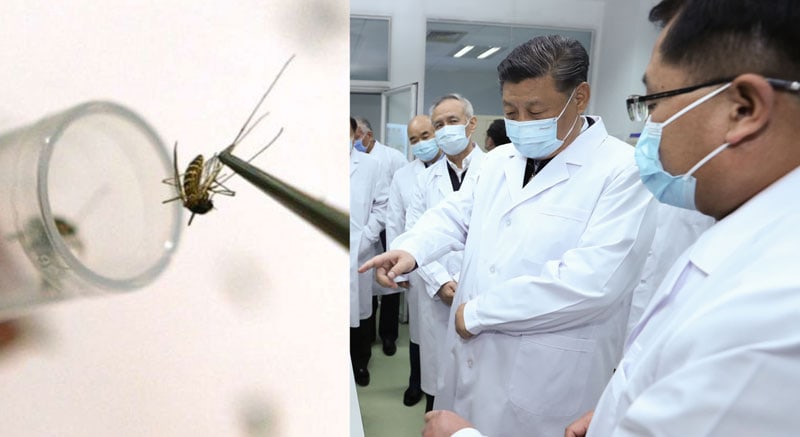Scientists in China are reportedly experimenting with the use of mosquitoes that could spread vaccines like a virus, without the use of shots, or consent.
Researchers have already been running trials of the technique on animals and plan to soon release the genetically-modified mosquitoes into the wild.
However, the possibilities for human exposure are obvious and ominous.
The Chinese Communist Party’s state-controlled propaganda outlet The South China Morning Post (SCMP) celebrated the development on Wednesday.
In its reporting, the SCMP quotes a paper from the Chinese Academy of Sciences that details a plan to send genetically-modified mosquitoes into the wild to spread vaccines among animals.
The scientists explain that their mosquitoes would bite animals to trigger a “strong, long-lasting immune response.”
The authors of the paper said their trials had been successful at making animal subjects more resistant to viral infections, most notably Zika.
The Zika virus was the big viral panic in the late 2010s before a certain other organism emerged from Wuhan, China at the end of the decade.
Zika is spread primarily by the Aedes aegypti mosquito, a wide-ranging pest that breeds in swamps around the world, including the United States.
The Zika crisis was particularly acute in Brazil, where pregnant women feared a mosquito bite could lead to birth defects or miscarriage from the virus.
Several proposals made over the past decade to fight Zika involved genetically modifying mosquitoes, usually with an eye toward neutering them and causing the populations to collapse as they stopped breeding.
The Chinese researchers essentially combined Zika with another virus called Chaoyang or CYV, which thrives in mosquitoes but not in larger animals.
It produces a harmless hybrid virus that tricks the immune systems of animals into thinking they have been infected with Zika.
The animals would then develop immunity to Zika and related viruses without ever actually suffering an infection.
According to the paper cited by the SCMP, the team at the Chinese Academy of Sciences fed blood laced with the inert CYV-Zika hybrid to mosquitoes.
The mosquitoes were then left to bite laboratory mice, passing the virus to them through saliva.
The mice developed useful antibodies that lasted for more than five months, allowing them to survive normally fatal doses of Zika virus injected by the research team.
Also, the mice did not pass Zika back to “clean” mosquitoes that bit them after they were infected.
“Each mouse was bitten up to three times by 30 different mosquitoes, to simulate natural conditions,” the SCMP noted.
This exposure is roughly equivalent to the experience of a human playing tennis in Florida for half an hour on a summer afternoon.
The Chinese team anticipated using their mosquito inoculation technique for the “protection of endangered wildlife, such as ruffled grouse decreased by West Nile virus.”
However, they said they could also use the technique to “control of zoonotic diseases infecting domestic animals and humans.”
The implication is that mosquito-based vaccine distribution would be used on animals in the wild, preventing them from developing viruses that could be passed along to humans.
One of the big reasons Beijing struggled to get its most vulnerable populations to accept vaccinations for COVID-19 is that a string of pharmaceutical-industry scandals left them deeply suspicious of the Chinese medical industry.
By introducing mosquito-based vaccines into the human population, the Communist regime could bypass public concerns about paramedical companies by spreading the vaccination like a virus, without people’s consent.
The idea of using mosquitoes as tiny flying vaccinators is not new.
In 2010, a group of Japanese researchers genetically engineered mosquitoes that could inject vaccines into humans through tiny drops of saliva.
The project focused on using a breed of malarial mosquito to dispense vaccinations against a parasitic disease called leishmaniasis that is normally spread by sand flies.
As with the new Chinese experiment described by the South China Morning Post, the Japanese team dispatched clouds of pet mosquitoes to bite laboratory mice dozens of times.
The scientists pronounced themselves satisfied with the rate of vaccine transmission.
Researchers around the world declared the experiment a “fascinating proof of concept.”
Many talked about the idea of using mosquitoes to vaccinate wild animals but backed away from using “flying syringes” on humans.
In September 2022, the University of Washington in Seattle conducted a clinical trial that involved using genetically-modified mosquitoes to inject live malarial parasites into human skin.
The parasites were also genetically modified to keep the subjects from getting sick.
As with the Chinese experiment, the goal was to provoke the bodies of the subjects to develop an immune response.
The Seattle experiment did not involve releasing mosquitoes into the wild.
Instead, the subjects were instructed to place their arms over a box filled with hundreds of mosquitoes and covered with a fine mesh.
The mosquitoes gleefully bit the human skin pressed against the mesh, delivering the modified parasites while causing a good deal of swelling and blistering.
One of the subjects said the mosquito box was “literally a Chinese food takeout container.”
“We use the mosquitoes like they’re 1,000 small flying syringes,” said Dr. Sean Murphy of the University of Washington, reviving the unfortunate metaphor from the Japanese experiment in 2010.
The Seattle trial was not conducted with an eye toward distributing vaccines through the mosquito population.
Instead, the mosquitoes were used as a more cost-effective means of injection, because the malarial parasites were difficult to administer with needles.
The results were not quite a roaring success, as only some of the participants gained protection from malaria and it only lasted for a few months.
However, researchers still celebrated the experiment as a “promising” first step toward using genetically-modified parasites to deliver inoculations.

Our comment section is restricted to members of the Slay News community only.
To join, create a free account HERE.
If you are already a member, log in HERE.